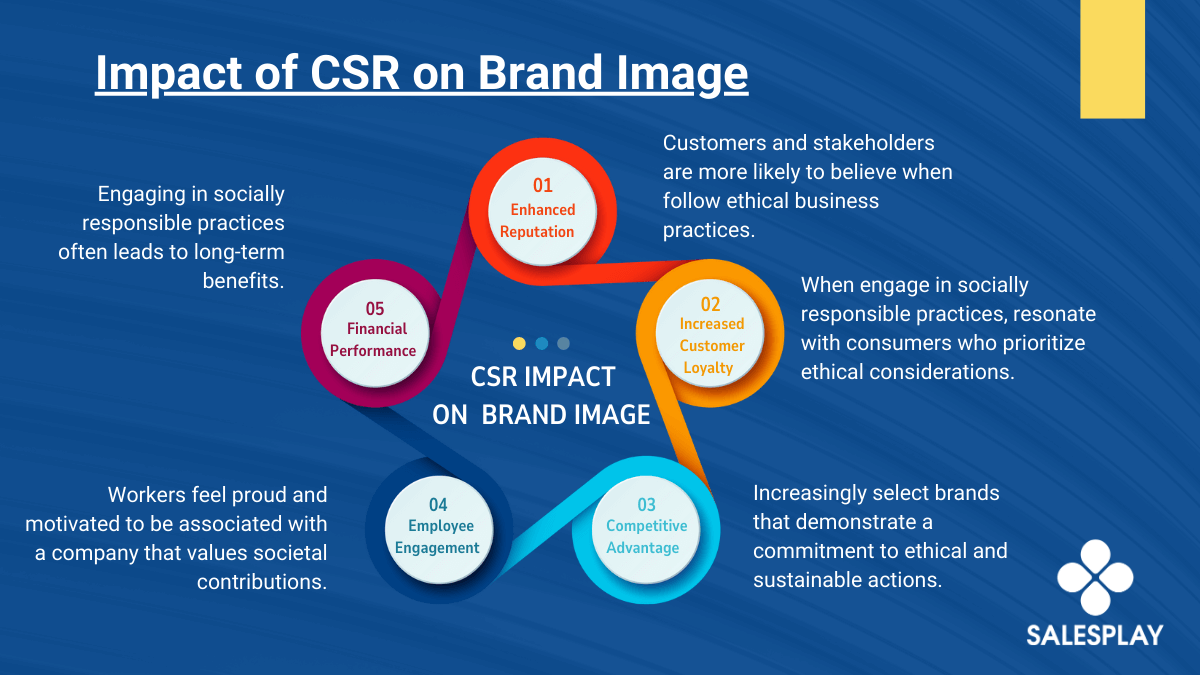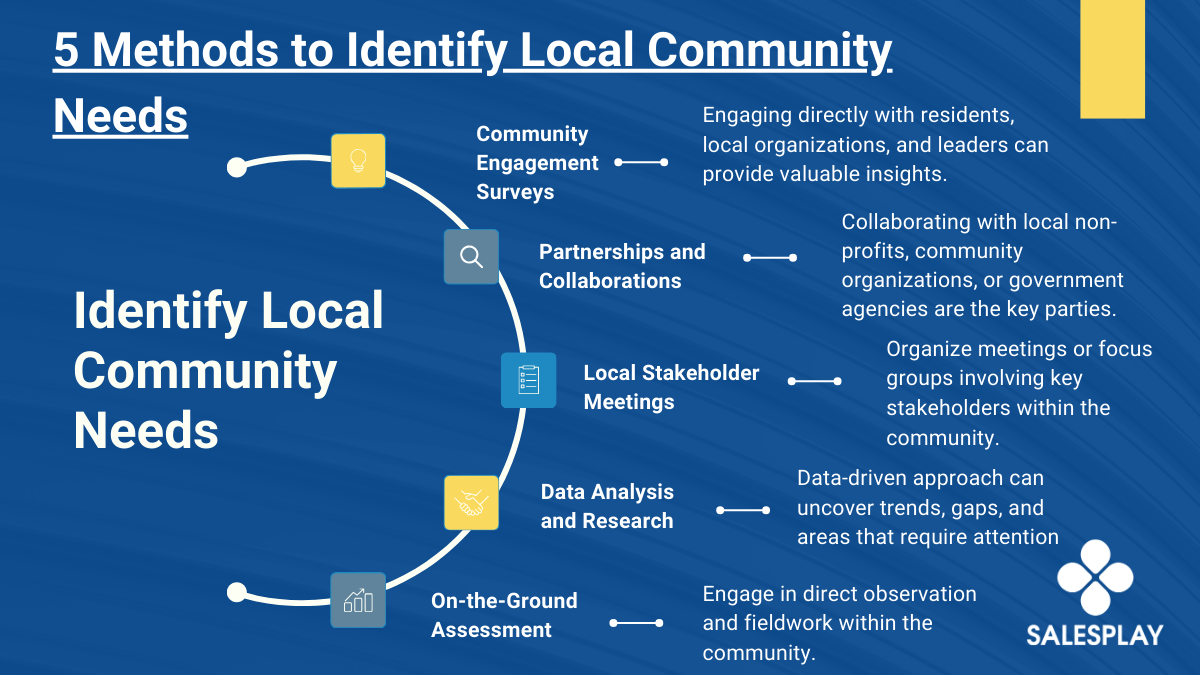Profits, profits, profits!
Isn’t it the main thing that comes to our minds when we talk about a business?
We start a business aiming for success and high profits. But there’s more to it than just making money; businesses also have a social responsibility. Striking the right balance between your business operations, receiving a good amount of profit from it, and being accountable and socially responsible is important.
But it’s not as easy as it seems, is it?

In this article, we will explore a practical guide to CSR activities and small business community engagement. If you are planning to kick off a startup business or you already are an owner, then this blog article is for you!
Social responsibility is key for all small business's trends. It builds trust, supports growth, and helps them stand out in competitive markets.
A company's ability to attract socially aware customers and establish credibility through community involvement and ethical business practices can increase brand loyalty.
Moreover, it helps recruit skills by attracting motivated workers looking for fulfilling work settings.

Small businesses that engage in social responsibility show dedication beyond profits. This creates long-term value and improves society.
In addition, small businesses that understand and uphold social responsibility not only benefit society at large but also provide a strong base for future success in a changing business environment.
Discover the power of CSR for small businesses: key benefits, creative ideas & real-world examples.
When it comes to being socially responsible, we always hear the term ‘CSR’ or Corporate Social Responsibility. Have you ever wondered what it really means?
We will simplify the true meaning of this. It describes a company's dedication to upholding moral principles and creating a beneficial impact on society in addition to its goal of financial gain. It includes integrating ethical, social, and ecological concerns into a business's operations and relationships with stakeholders.

CSR initiatives cover a wide range of activities, including ethical labor practices, small business community engagement, sustainable sourcing, and charity. As we mentioned above, the main objective is striking a balance between a commitment to social and environmental justice and commercial prosperity.
Moreover, businesses build a bridge out of CSR for small businesses to improve their brand, have a good social effect, gain the trust of stakeholders, and generate shared value for their company and the communities they serve.
Explore CSR for Small Business? - Corporate Social Responsibility

People trust businesses that follow ethical practices and engage with the community.
Socially concerned partners and customers are drawn to small businesses that develop a positive image through CSR efforts for small businesses, giving them a competitive advantage.
However, you know the best thing about this is that improved brand loyalty is a result of this improved reputation, which also creates new opportunities and supports market development and sustainability.
Explore small business reputation management: powerful tips to build trust and credibility.
Now, let’s see how this builds customer loyalty.
When small enterprises engage in socially responsible practices, they resonate with consumers who prioritize ethical considerations.
You should not forget that nowadays, people, especially younger generations have started moving forward in eco-friendliness which is a good movement. Businesses that support social and environmental causes attract and keep like-minded customers. Such loyalty results in repeat purchases, positive word-of-mouth referrals, and a dedicated customer base.
Accordingly, step-by-step, this increased loyalty strengthens the brand's position in the market and contributes to sustained success for the business.
In this section, we focus on a benefit that ultimately gains you a good position in the current market.
By staying committed to social responsibility, businesses stand out from competitors. Consumers increasingly select brands that demonstrate a commitment to ethical and sustainable actions, giving CSR-oriented businesses an edge.

In addition, this differentiation attracts a segment of socially conscious customers, enhancing market positioning and driving sales.
CSR for small businesses serves as a strategic tool, helping them stand out and develop a unique selling proposition, setting them apart and enabling long-term success in the competitive landscape.
For example, a local café reduced waste by switching to biodegradable packaging, attracting eco-conscious customers.
Dive into small business competitive advantage: proven strategies to stand out and thrive.
This is an indirect benefit for your business which is worth thousands of times.
When a company actively participates in socially responsible initiatives, it obviously creates a sense of purpose among employees. Workers feel proud and motivated to be associated with a company that values societal contributions, leading to higher job satisfaction and increased productivity.

Moreover, engaging in CSR initiatives for small businesses also attracts and retains top talent, as individuals seek workplaces aligned with their values. As the best outcome, this creates effective team management strategies and heightened employee engagement, contributes to a positive work culture and strengthens the business from within.
Explore 10 employee engagement strategies for small businesses to elevate your small business.
Here we have come to the utmost important phase as a profit-expecting entity, which is financial performance.
Engaging in socially responsible practices often leads to long-term benefits, including increased sales and customer loyalty.
A positive brand image built through CSR for small businesses activities attracts investors, boosts shareholder confidence, and opens opportunities for partnerships. Moreover, cost-saving measures, such as sustainable practices, can enhance operational efficiency.
In addition, the long-term, cumulative impact of corporate social responsibility on financial performance strengthens the company's resilience and stability, promoting long-term profitability and expansion.

Conducting surveys or questionnaires within the local community will help you to understand their priorities and needs.
Engaging directly with residents, local organizations, and leaders can provide valuable insights into pressing issues and areas where support is needed.
Explore how to enhance community engagement: essential toolkit & survey strategies for success.

Collaborating with local non-profits, community organizations, or government agencies are the key parties here.
Such partnerships provide direct insight into community needs and ongoing initiatives. Building relationships with these entities allows businesses to better understand and address specific needs.
You could organize meetings or focus groups involving key stakeholders within the community, such as residents, businesses, activists, and local leaders.
These gatherings provide a platform for open dialogue, allowing businesses to gather diverse perspectives and identify critical community needs.
It is a wise method to analyze available data, including demographic information, economic reports, and social studies, to gain insights into the community's challenges and opportunities.
This data-driven approach can uncover trends, gaps, and areas that require attention.

This means that you could engage in direct observation and fieldwork within the community.
When physically present and interacting with locals, businesses can gain firsthand knowledge of the community's dynamics, needs, and potential areas for CSR interventions. This approach offers a personal understanding that may not be evident through other means.
Sustainable practices extend business lifespan, reduce environmental impact, and meet customer expectations.
Businesses reduce the consumption of resources, reduce carbon footprints, and lessen environmental damage by using eco-friendly practices.
Moreover, this strategy supports resilience against market swings and cost-efficiency while simultaneously guaranteeing the preservation of natural resources.
A sustainable brand attracts ethical customers and builds loyalty. It gives businesses a competitive edge in a market that is becoming more environmentally concerned, drawing capital and encouraging creativity.
In the end, sustainable business practices provide long-term prosperity and environmental well-being while opening the door to a more moral, accountable, and future-proof corporate model.

It is visible that local organizations usually possess in-depth knowledge of community needs, enabling more targeted and impactful CSR initiatives for small business if you hold hands with them.
Partnering with established local entities builds trust among community members, increasing the acceptance and effectiveness of CSR efforts.
These partnerships clear the road for you to access local networks which allows for broader reach and engagement, facilitating more extensive and sustainable CSR outcomes.
This collaboration allows for pooling resources, reducing duplication of efforts, and maximizing the impact of CSR initiatives within the community.
Discover how building strategic partnerships can propel your small business to new heights of growth and success.
In this section let’s see what you could do to educate society about your CSR initiatives for small business in order to aim for the best outcome.

Being socially responsible has hidden major benefits that you can’t see at first glance. In the following section, we will look at the long-term benefits of your CSR efforts for small business.
Enhanced Reputation and Brand Loyalty- Engaging in CSR builds trust and credibility, building a loyal customer base that appreciates ethical practices.
Sustained Growth and Competitiveness- CSR initiatives differentiate small businesses in crowded markets, providing a competitive edge that attracts socially conscious consumers.
Attracting Top Talent and Employee Retention- Commitment to social causes attracts purpose-driven employees, fostering a positive work culture and reducing turnover rates.
Cost Savings and Efficiency- Sustainable practices often lead to reduced waste, energy consumption, and operational costs, contributing to long-term financial savings.
If you hold hands with a Best Point-of-Sale (POS) system for small business like SalesPlay POS, it will help you to stay away from printed versions of the receipts, bills and invoices as the SalesPlay POS system can send the e-receipts to the customers via social messaging apps which saves your money, and time and reduce the wastage at the end.
Risk Mitigation and Resilience- CSR strategies anticipate and address societal and environmental concerns, reducing potential risks and enhancing the company's resilience against market fluctuations.

There is no set of rules to follow when you walk on the socially responsible road with your small business.
You have the freedom to be creative and innovative when finding your best way towards a better business future. The only thing is you cannot forget that your business and society are interwoven elements.
If you cultivate the good, you will receive the ‘good’ harvest in the end for sure.
Ready to make a difference? Join SalesPlay POS today to streamline your CSR efforts and grow your business sustainably.

Corporate Social Responsibility (CSR) isn't just for big companies—it’s great for small businesses too! A simple yet effective example is a local café sourcing coffee from fair-trade farmers. This ensures ethical practices while supporting sustainable farming communities.
Another example is a boutique donating a portion of sales to local charities. Imagine a small clothing store pledging 5% of profits to a nearby shelter—customers feel good about shopping!
Small businesses can also practice CSR by reducing plastic waste. A bakery switching to biodegradable packaging shows care for the environment while attracting eco-conscious customers.
Even service-based businesses can contribute. A neighborhood salon offering free haircuts to the homeless once a month spreads kindness and builds community goodwill.
CSR doesn’t need to be costly or complicated. Simple initiatives, like offering employee volunteer days or hosting charity events, make a big impact. Small businesses can thrive while making the world a better place!
Absolutely! Small businesses can do Corporate Social Responsibility (CSR) just like big companies—it’s all about giving back creatively.
Even with limited budgets, small businesses can engage in CSR through community projects, eco-friendly practices, or ethical sourcing. For example, a local café can donate leftover food to shelters, while a boutique can use sustainable packaging.
Supporting local charities, organizing fundraisers, or volunteering as a team are great ways to make a difference. Small businesses can also offer discounts to healthcare workers, students, or seniors, showing appreciation while giving back.
Going green is another CSR approach! Using energy-efficient appliances, reducing plastic use, or encouraging reusable bags can positively impact the environment.
CSR doesn’t have to be expensive. Even simple acts like sharing awareness campaigns on social media or mentoring young entrepreneurs count. Customers appreciate businesses that care about their communities, making CSR a win-win!
So yes, small businesses can (and should) do CSR—it’s not about size, but about impact!
A Corporate Social Responsibility (CSR) policy is a business’s way of giving back to society while staying ethical and sustainable. For small businesses, CSR doesn’t have to be expensive or complicated—it’s about making a positive impact in simple ways.
One key area is community involvement. This can be anything from sponsoring local events to donating products or services to those in need. Even small acts, like supporting local charities, can make a big difference.
Another essential aspect is sustainability. Small businesses can reduce waste, switch to eco-friendly packaging, or use energy-efficient practices. These small changes add up and show customers that the business cares about the environment.
Ethical labor practices also play a role. Treating employees fairly, offering a positive work environment, and supporting work-life balance are key CSR elements.
A strong CSR policy helps build trust, improves brand reputation, and creates loyal customers. Plus, it just feels good to do the right thing!
The 3 C’s of community engagement are Collaboration, Communication, and Commitment. These three pillars help build strong, meaningful connections with a community. Let’s break them down!
Community engagement thrives on teamwork! Whether it’s local businesses, volunteers, or organizations, working together brings fresh ideas and solutions. Collaboration ensures that everyone’s voice matters and creates a sense of unity.
Talking and listening go hand in hand. Effective communication helps build trust, clear misunderstandings, and keep everyone informed. Whether through social media, meetings, or casual chats, keeping the conversation open makes engagement stronger.
Engaging with a community isn’t a one-time thing—it’s an ongoing effort! Long-term commitment builds credibility, strengthens relationships, and leads to real impact. When people see consistent effort, they feel valued and involved.
Master these three C’s, and you’ll create a thriving, connected community!
Community engagement for a business means actively interacting with customers, local groups, and online communities to build relationships and trust. It involves responding to feedback, supporting local initiatives, and creating meaningful conversations that strengthen customer loyalty.
Businesses engage with communities in various ways, such as hosting events, supporting charities, or participating in online discussions. Social media plays a huge role, allowing businesses to connect with customers in real time and show their brand personality.
A great example is a local café organizing a free coffee day to thank loyal customers. This small act builds goodwill and keeps customers coming back. Similarly, a clothing brand that donates a portion of sales to environmental causes fosters trust and attracts socially conscious buyers.
By engaging with the community, businesses create a positive reputation, boost customer retention, and encourage word-of-mouth marketing. It’s not just about selling—it’s about being a valued part of people’s lives.